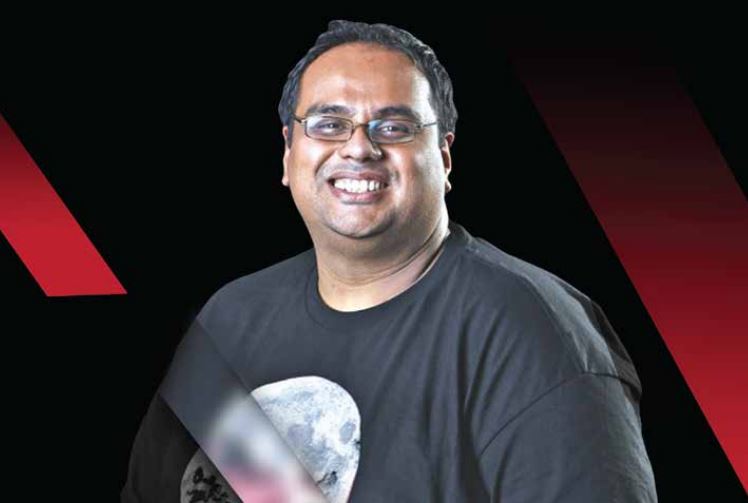Spotlight Personage: Wahid Ibn Reza

VoB Bulletin 1st Issue
August 6, 2021
VoB Writing Contest 2021
October 15, 2021Animator, screenwriter, film maker, actor, writer and engineer - Wahid Ibn Reza is a man of many talents. He has worked in possibly every sphere of the arts industry and has been a part of plethora outstanding projects. He has experience in working as the VFX co-ordinator in some of the most beloved films and TV shows ever. Currently, he is working on Surviving 71, an animated short film about the liberation war of Bangladesh. His enthusiasm for writing has also inspired him to work in the vast arena of animated TV shows and writing a lot of animated series.
Question: Being a Mechanical Engineer graduate from BUET, working in the arts industry, and having a credulous career surrounding entertainment alongside working in VFX is beyond being praiseworthy. How did that happen and what got you into this line of work?
I always wanted to study in BUET and I was lucky to get into Mechanical Engineering. In second year, we arranged a mechanical festival and we made a short-film for the first time in the history of BUET. I wrote and acted in that film. The large auditorium of BUET was full and even though the sound and everything was awful, it was such a wonderful funny piece. That is when I realized what I wanted to do with my life. After graduating from BUET, I wanted to follow my passion and work as a writer. I was very fortunate to work with Humayun Ahmmed Sir and got my first big break in acting with him by working in four Eid dramas in one Eid. Then I did some back to back acting and did a commercial for White Plus toothpaste with Mostofa Sarwar Farooki.
I liked acting but it was more like a hobby. I was the Head Writer at Grey Bangladesh and wrote in a segment for BBC. I really wanted to explore the opportunities to work in a film in North America. I got into the University of British Columbia in Vancouver in 2010 and got a second bachelor degree in Fine Arts in Film Production. Vancouver is a big industry for animation and VFX and I was fortunate enough to start working at Bardel Entertainment. It’s an animation studio and I was a production assistant on “Rick & Morty”. Then I got a job offer at Moving Picture Company which is a VFX studio and I worked as a VFX coordinator for “Game of Thrones''. The episode of attacking the wall was an unreal experience for me and it was my first ever exposure to visual effects. And then I worked in Batman vs. Superman, Captain America: Civil War, Doctor Strange which got nominated for an Oscar, then Guardians of The Galaxy Volume 2 which also got nominated for an Oscar.
Question: You have contributed to some of the most popular movies and TV shows of recent times in the VFX industry. How did you become that good at VFX?
Almost everyone in film school wants to become a director or a writer but it's very tough, so you need to have an alternative plan. After graduating, I was applying in different places but there was no reply even after I had already interned in “Suits” for 6 months, my films went to festivals and my result was very good. So I found out that I was turned down because of including my Bangladeshi experience in the CV, as they were thinking that I don't have a work permit.
Then I started applying to animation VFX studios and Bardel offered me an unpaid internship. But after the interview, they offered me a production assistant role. PAs usually do random and mundane stuff, but I worked really hard and did things in one hour which were supposed to be done in half a day. I started helping in different shows, and after the first season, I was managing payrolls, assigning artists, downloading tasks, and putting notes from our assistant director. Bardel offered me the role of production coordinator but I didn't really like the show. I wanted to do something that I love alongside exploring something else. That’s when the VFX offer from MPC came in and they offered “Game of Thrones”. I almost literally worked in every show there at that time. After three months, I was the most senior coordinator. Then they offered me a permanent position and I worked in “Batman vs. Superman”. But I really wanted to do a Marvel show and my boss from MPC who had moved to another company recommended me there. They were looking for people and they reached out to me.
I worked on “Captain America: Civil War” and at the end of “Guardians of Galaxy 2”, I had a personal tragedy, my mom passed away. So I was in Bangladesh for 2 months and when I came back, I was given options to work on. I worked on “Avengers: Infinity War”, “Blackpanther”, and “The New Mutants”. I worked for“Godzilla” and a bunch of stuff but I was really sad and depressed. At that time, I wanted to do cartoons because even on the worst possible day, I would be watching cartoons. Sony was hiring for Hotel Transylvania 3 and the director Genndy Tartakovsky was my all time idol. I got the job and followed the passion like the stories I wanted to be a part of. That’s how I got to be a part of the films and TV shows.
Question: How would someone do it now if they wanted to follow your footsteps?
People working in the VFX sector need to focus on different parts of the tasks. The technology part includes the hardware and software support and then there is pipeline support and creating tools. The other parts include managing artists, animators, painters, the management, and production. The deadline of each film is very strict and for that, back calculation is required. The production team ensures that there is everything that everyone needs. Someone who is not an artist but still passionate about film, can join film school which is a good way to learn producing skills. 90% of the work is learned at the job because every company has different tools. Being very organized, passionate, adamant and confident is important and then you should be able to win it.
Question: If you had to choose one job to keep for the rest of your life out of all the activities of writing, directing, acting, and being a VFX coordinator, which would it be and why?
I have written poems and I used to work as a writer at “Unmad”. We sort of called ourselves the brain behind the cartoon and we wrote the jokes. If I have to choose one job to keep for the rest of my life, that would be writing. Because, I absolutely love writing. Being a writer lets me be anywhere I want to be from my desk which I love. I can literally go to Mars, or to the top of Mount Everest or deep beneath the ocean while writing. All I need is my laptop or notepad and a pen like old school. I would give anything to write.
Question: What worked as your inspiration behind making Surviving 71, the feature film based around the struggle of our people?
My father was a freedom fighter and he told me the story about him getting captured. They were blindfolded and kept off from a moving train and when his time came, he jumped off and survived. It was such a cinematic story and I just wanted to make something out of it. I really wanted to make a feature film but surprisingly we don’t get a budget for doing things back home. So I convinced myself to make a short-film. The purpose is to ignite a flame that will spark curiosity and interest to know what actually happened. I think if I can do that then my job is done at least for the time being.
Question: What sort of infrastructural or fundamental changes would you suggest for ensuring that the younger generation has the education, freedom and resources to make the dream of a better Bangladesh a reality?
We have to utilize our large population. We take them for granted and don’t give them enough value. There are so many accidents, rapes, acid violence and disasters. I think we need to value our lives and tell people that their life, work, contribution, and service matter. We have seen remarkable changes in education and empowerment of women which is contributing to the GDP of the economy. Roads, electricity, mobile-network, internet etc. got developed. If we value our life and tie all these together, I can't see why we can't become more advanced and better. The changes have to come from the root level to the very top level. There is a gap between the mass people and the ruling class. If we can reduce that gap, give people ownership and basic support; they will value you back and they will put their effort into the country and wonderful things will happen.
Question: What would be your suggestions for Bangladeshi film and entertainment industry?
I think fundamentally our distribution system is pretty messed up. There are not really good cinema halls and we can’t show films. We need to restructure our distribution system. And then we need to utilize the technology. We have a lot of cameras right now and shooting various stuff is easier with DSLRs now. The technology is there and we have to learn to tell and focus on stories. The story is a fundamental piece of a film or a good TV show. We can focus on creating niche and genre-based content, stories that are very strong and powerful and then films would be our ‘Jamdani Sharee’ which is very unique in terms of styles and colors.
Interviewed by:
Arundhuti Urmila
Maisha Nawar
Editorial Contributor:
Kazi Faisal Arefin
Fahmid Islam Sadhin

